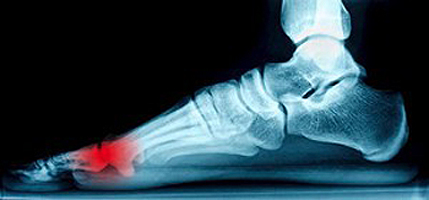Where Are the Sesamoid Bones Located?
Monday, 18 February 2019 00:00 There are two bones that are located under the bottom of the big toe that are referred to as the sesamoid bones. If they should become inflamed, which may be the result of injury or overuse, sesamoiditis may develop. Many patients will experience pain if that area of the foot is touched, and may have difficulty in walking. A proper diagnosis is necessary to perform before beginning the correct treatment, which typically includes having an X-ray taken, or obtaining a bone scan or MRI. Mild relief may be found when there is additional cushioning added to the shoes, which may be effective in relieving a portion of the pressure. It may be beneficial to refrain from the activities that may have caused this condition, and comfort may be found when the foot is resting. If you have pain under the big toe, it is advised to schedule a consultation with a podiatrist who can properly treat sesamoiditis.
There are two bones that are located under the bottom of the big toe that are referred to as the sesamoid bones. If they should become inflamed, which may be the result of injury or overuse, sesamoiditis may develop. Many patients will experience pain if that area of the foot is touched, and may have difficulty in walking. A proper diagnosis is necessary to perform before beginning the correct treatment, which typically includes having an X-ray taken, or obtaining a bone scan or MRI. Mild relief may be found when there is additional cushioning added to the shoes, which may be effective in relieving a portion of the pressure. It may be beneficial to refrain from the activities that may have caused this condition, and comfort may be found when the foot is resting. If you have pain under the big toe, it is advised to schedule a consultation with a podiatrist who can properly treat sesamoiditis.
Sesamoiditis is an unpleasant foot condition characterized by pain in the balls of the feet. If you think you’re struggling with sesamoiditis, contact Dr. Scott Shrem of Garden State Foot & Ankle Center. Our doctor will treat your condition thoroughly and effectively.
Sesamoiditis
Sesamoiditis is a condition of the foot that affects the ball of the foot. It is more common in younger people than it is in older people. It can also occur with people who have begun a new exercise program, since their bodies are adjusting to the new physical regimen. Pain may also be caused by the inflammation of tendons surrounding the bones. It is important to seek treatment in its early stages because if you ignore the pain, this condition can lead to more serious problems such as severe irritation and bone fractures.
Causes of Sesamoiditis
- Sudden increase in activity
- Increase in physically strenuous movement without a proper warm up or build up
- Foot structure: those who have smaller, bonier feet or those with a high arch may be more susceptible
Treatment for sesamoiditis is non-invasive and simple. Doctors may recommend a strict rest period where the patient forgoes most physical activity. This will help give the patient time to heal their feet through limited activity. For serious cases, it is best to speak with your doctor to determine a treatment option that will help your specific needs.
If you have any questions please feel free to contact our office located in Hazlet, NJ . We offer the newest diagnostic and treatment technologies for all your foot and ankle needs.
Blog Archives
- April 2025
- March 2025
- February 2025
- January 2025
- December 2024
- November 2024
- October 2024
- September 2024
- August 2024
- July 2024
- June 2024
- May 2024
- April 2024
- March 2024
- February 2024
- January 2024
- December 2023
- November 2023
- October 2023
- September 2023
- August 2023
- July 2023
- June 2023
- May 2023
- April 2023
- March 2023
- February 2023
- January 2023
- December 2022
- November 2022
- October 2022
- September 2022
- August 2022
- July 2022
- June 2022
- May 2022
- April 2022
- March 2022
- February 2022
- January 2022
- December 2021
- November 2021
- October 2021
- September 2021
- August 2021
- July 2021
- June 2021
- May 2021
- April 2021
- March 2021
- February 2021
- January 2021
- December 2020
- November 2020
- October 2020
- September 2020
- August 2020
- July 2020
- June 2020
- May 2020
- April 2020
- March 2020
- February 2020
- January 2020
- December 2019
- November 2019
- October 2019
- September 2019
- August 2019
- July 2019
- June 2019
- May 2019
- April 2019
- March 2019
- February 2019
- January 2019
- December 2018
- November 2018
- October 2018
- September 2018
- August 2018
- July 2018
- June 2018
- May 2018
- April 2018
- March 2018








